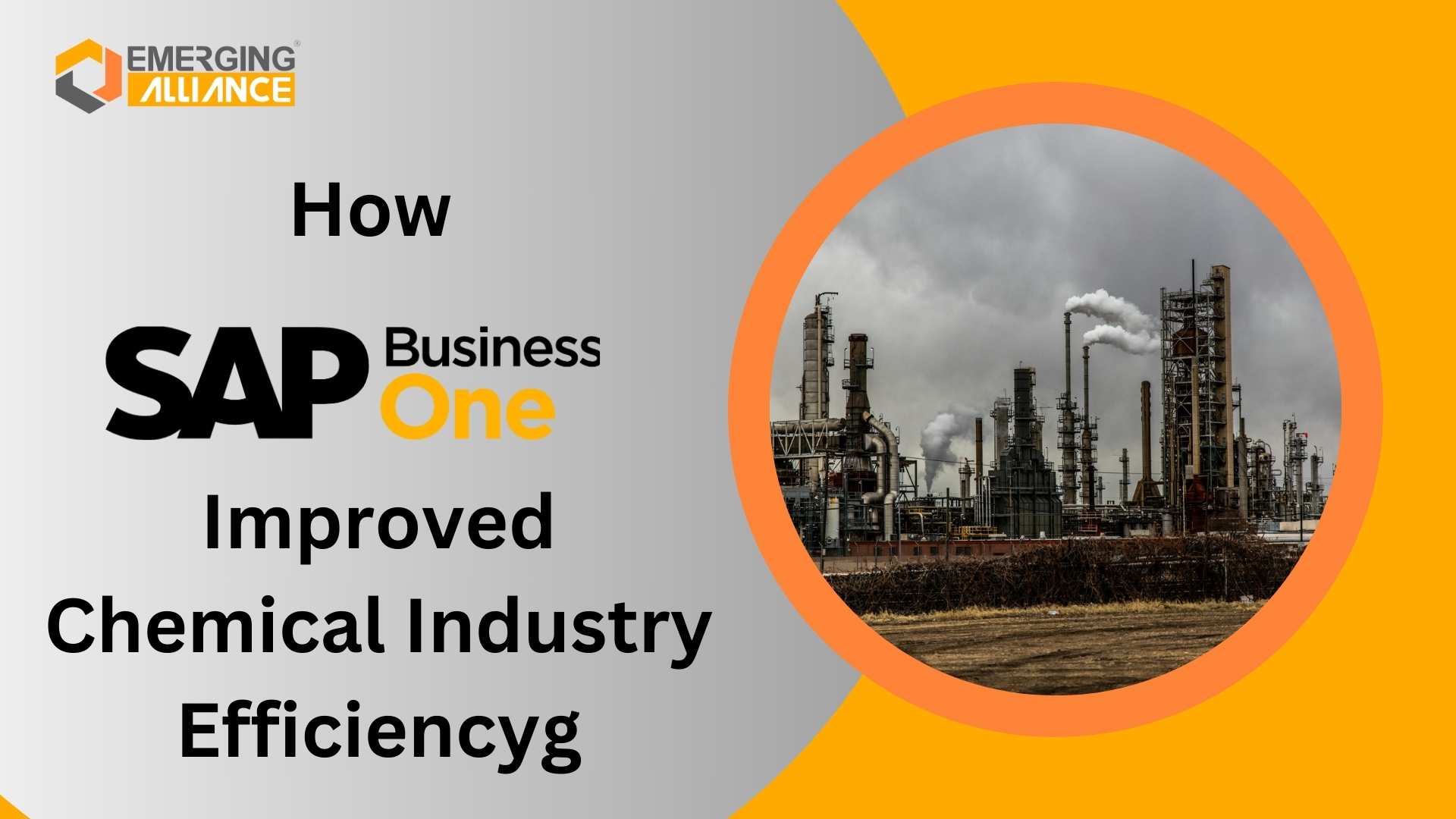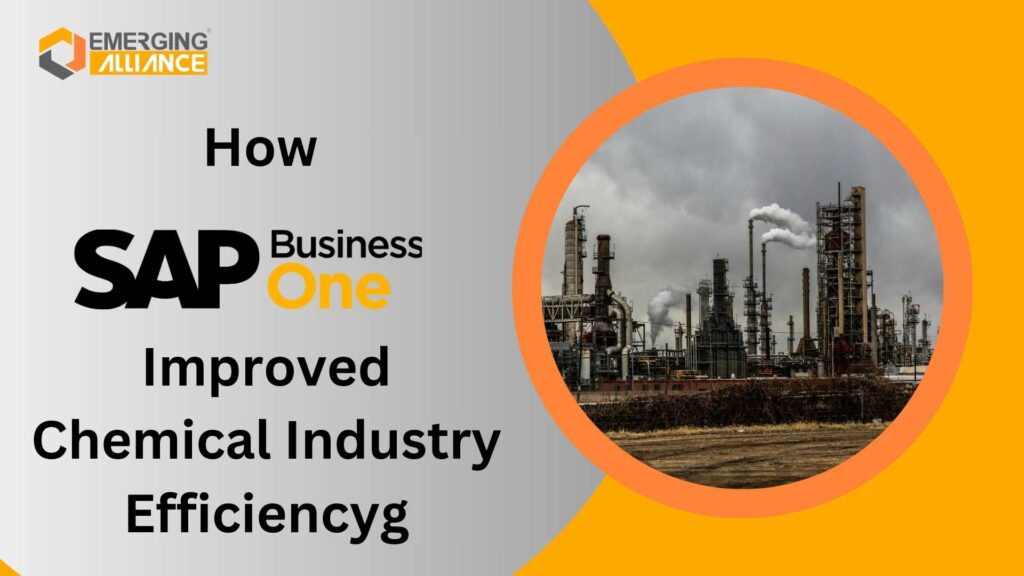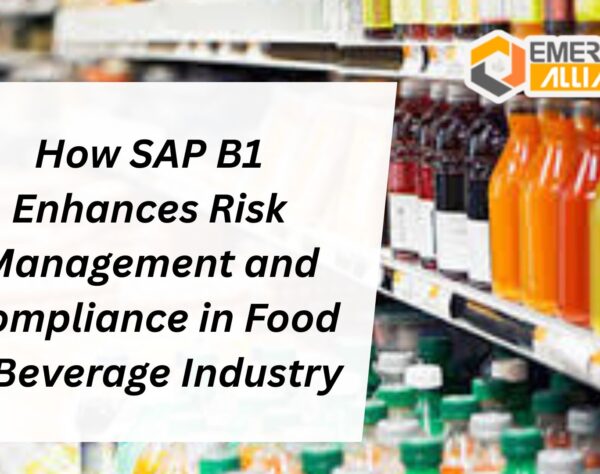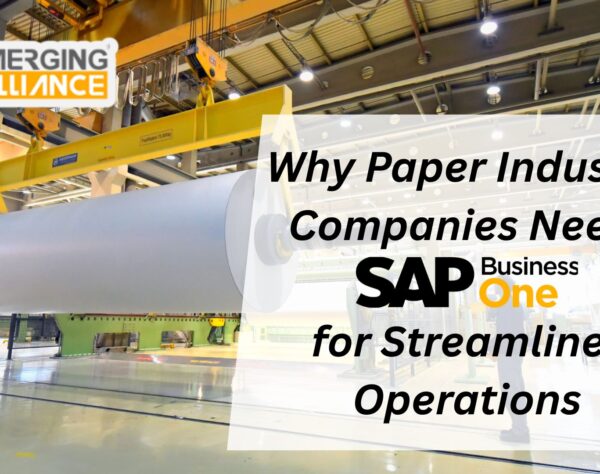
How SAP Business One Improved Chemical Industry Efficiency

Digital Transformation in Chemical Industry: The Role of SAP Business One
The chemical industry is one of the most complex and highly regulated sectors. From raw material sourcing to production, quality control, and regulatory compliance, businesses face numerous challenges. Managing such an intricate process manually or with outdated systems can lead to inefficiencies, increased costs, and compliance risks. SAP Business One (SAP B1) has emerged as a powerful ERP solution that helps chemical companies optimize operations, ensure compliance, and drive business growth. By automating critical processes and integrating data across departments, SAP Business One enhances operational efficiency and decision-making.
This blog explores how SAP Business One improves efficiency in the chemical industry, its key benefits, and how companies can leverage it to stay competitive.
Challenges in the Chemical Industry
Before exploring the impact of SAP B1, let’s understand the key challenges faced by chemical Industry:
- Regulatory Compliance: Strict industry regulations require businesses to maintain accurate records of chemicals, safety measures, and environmental impact.
- Supply Chain Complexity: Managing raw materials, production schedules, and deliveries efficiently is crucial.
- Quality Control: Ensuring product consistency and quality at every stage is vital to maintain brand reputation.
- Inventory Management: The volatility of raw material prices and storage concerns make inventory management a challenging task.
- Cost Optimization: Rising material and labor costs make it essential for businesses to optimize production and resource allocation.
- Risk Management: Handling hazardous chemicals requires robust risk mitigation strategies.
- Customer Demand & Product Customization: Meeting evolving customer expectations while ensuring profitability is a challenge.
How SAP B1 Improves Chemical Industry Efficiency
SAP B1 provides integrated solutions to streamline chemical Industry business operations. Let’s explore how it enhances efficiency:
1. Ensuring Regulatory Compliance
Chemical companies must adhere to strict environmental, health, and safety regulations. SAP Business One automates compliance tracking by:
- Maintaining a database of regulatory requirements.
- Automating safety data sheet (SDS) management.
- Generating compliance reports with real-time data.
- Reducing the risk of regulatory violations and associated penalties.
2. Enhancing Supply Chain Management
SAP Business One optimizes supply chain management by:
- Offering real-time tracking of raw materials and finished products.
- Automating purchase order generation and supplier management.
- Improving demand forecasting and minimizing production delays.
3. Strengthening Quality Control
Quality assurance is critical in the chemical industry. SAP Business One helps by:
- Automating quality inspections at different production stages.
- Tracking product consistency through batch management.
- Providing detailed audit trails for quality compliance.
4. Optimizing Inventory Management
Managing inventory efficiently prevents material wastage and reduces costs. SAP Business One helps by:
- Automating stock level tracking and alerts for low inventory.
- Implementing first-in, first-out (FIFO) or other inventory rotation strategies.
- Ensuring raw materials are stored in optimal conditions.
5. Improving Cost Management
Cost optimization is crucial for profitability. SAP Business One provides:
- Real-time insights into production costs.
- Budgeting and financial planning tools.
- Automated expense tracking and cost allocation.
6. Enhancing Risk Management
Handling hazardous chemicals requires a proactive risk management strategy. SAP Business One supports:
- Safety data tracking and hazard communication.
- Real-time monitoring of chemical storage conditions.
- Incident tracking and response planning.
7. Driving Better Decision-Making with Data Analytics
SAP Business One provides real-time data analytics and dashboards that help businesses:
- Identify trends and optimize production planning.
- Monitor supply chain performance.
- Make data-driven decisions to improve overall efficiency.
8. Streamlining Customer Relationship Management (CRM)
Customer expectations are evolving, and businesses need to deliver personalized services. SAP Business One helps by:
- Providing a 360-degree view of customer interactions.
- Automating order processing and tracking.
- Enhancing customer service with real-time insights.
9. Boosting Scalability & Flexibility
As chemical companies grow, they need scalable ERP solutions. SAP Business One supports:
- Easy integration with third-party applications.
- Customizable workflows to meet business needs.
- Cloud-based solutions for remote access.
10. Enhancing Production Planning & Resource Allocation
Production efficiency is key to business success. SAP Business One helps by:
- Automating production scheduling.
- Optimizing resource utilization.
- Reducing production downtime through predictive maintenance.
Frequently Asked Questions (FAQs)
1. How does SAP Business One help with chemical industry compliance?
SAP B1 automates regulatory compliance tracking, generates reports, and ensures adherence to safety standards, reducing the risk of violations.
2. Can SAP Business One handle hazardous chemical management?
Yes, it includes safety tracking, risk management tools, and compliance monitoring to ensure proper handling of hazardous chemicals.
3. How does SAP Business One improve supply chain efficiency?
It provides real-time tracking of inventory, automates purchase orders, and optimizes supplier management to reduce production delays.
4. Is SAP Business One suitable for small and medium-sized chemical businesses?
Yes, it is designed for SMEs and can be scaled as the business grows.
5. Can SAP Business One integrate with existing software in chemical companies?
Yes, it supports integration with third-party applications like laboratory information systems and CRM tools.
6. How does SAP Business One help in cost management?
It provides financial insights, budget tracking, and automated expense management to optimize costs.
7. Does SAP Business One support batch tracking?
Yes, it offers comprehensive batch tracking and traceability features to ensure quality control.
8. Can SAP Business One be deployed on the cloud?
Yes, SAP B1 offers cloud-based deployment options for better flexibility and remote access.
9. How does SAP Business One improve customer relationships?
It provides a centralized CRM system for managing customer orders, interactions, and support services.
10. What are the implementation challenges of SAP Business One in the chemical industry?
Challenges include data migration, employee training, and customization needs. However, with proper planning and expert guidance, these challenges can be managed effectively.
SAP Business One is a game-changer for the chemical industry, helping businesses streamline operations, maintain compliance, and improve efficiency. By automating key processes and providing real-time insights, SAP B1 ensures that chemical companies remain competitive in an evolving market.
Investing in SAP Business One is a strategic decision that can transform the way chemical businesses operate, reduce risks, and boost overall profitability.
For chemical companies looking to optimize their processes and achieve long-term success, implementing SAP Business One is the key to a smarter, more efficient future.
Ready to take your Chemical Industry business to the next level? Contact us today to explore how SAP Business One can transform your operations!







